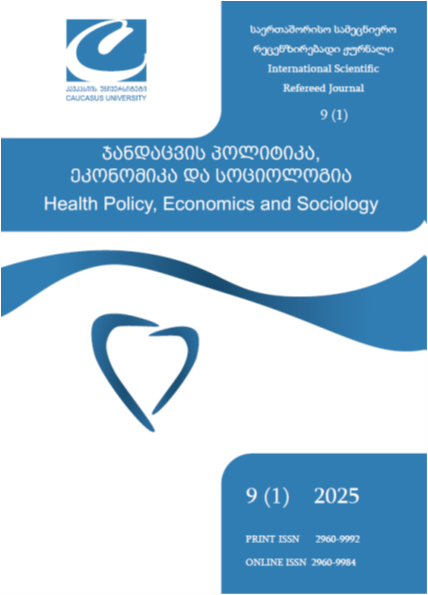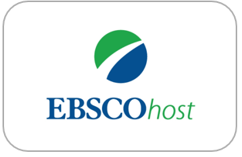ნაწლავის მიკრობიოტის როლი პოლიკისტოზური ოვარიუმის სინდრომსა და ინსულინრეზისტენტობაში
DOI:
https://doi.org/10.52340/healthecosoc.2025.09.01.10ანოტაცია
შესავალი: პოლიკისტოზური ოვარიუმის სინდრომი (PCOS) გავრცელებული ენდოკრინული დარღვევაა რეპროდუქციული ასაკის ქალებში, რომელსაც თან ახლავს ინსულინრეზისტენტობა (IR), ჰიპერანდროგენიზმი და ოვულაციის მოშლა. უკანასკნელი კვლევები მიანიშნებს ნაწლავის მიკრობიოტასა და ამ მეტაბოლურ დარღვევებს შორის პოტენციურ კავშირზე. ეს მიმოხილვა მიზნად ისახავს შეისწავლოს ნაწლავის მიკრობიოტის როლი პოლიკისტოზური ოვარიუმის სინდრომთან ასოცირებული ინსულინრეზისტენტობის პათოფიზიოლოგიაში. მეთოდები: ჩატარდა სისტემური ლიტერატურის მიმოხილვა PubMed-ის, Scopus-ისა და Google Scholar-ის მონაცემთა ბაზებში. შესწავლილი იყო 2011–2022 წლებში ინგლისურ ენაზე გამოქვეყნებული დაკვირვებითი ან კლინიკური ხასიათის კვლევები, რომლებიც ეხებოდა პოლიკისტოზური ოვარიუმის სინდრომით დაავადებულ ქალებში ნაწლავის მიკრობიომის ცვლილებებსა და ინსულინრეზისტენტობას. ანალიზისას შეფასდა მიკრობიომის კვლევის მეთოდები, კონკრეტული ბაქტერიული ჯგუფები, ინსულინრეზისტენტობის ინდიკატორები (მაგ. HOMA-IR) და თერაპიული ჩარევები. შედეგები: პოლიკისტოზური ოვარიუმის სინდრომით დაავადებულ ქალებს აღენიშნებათ მიკრობული მრავალფეროვნების შემცირება: დაბალია სასარგებლო SCFA (მოკლემოლეკულური ცხიმოვანი მჟავების) მწარმოებელი ბაქტერიების (Faecalibacterium prausnitzii) დონე და მომატებულია ანთებითი ბაქტერიები (Bacteroides, Enterococcus). ეს ცვლილებები ზრდის ნაწლავის განვლადობას, იწვევს ქრონიკულ ანთებას და არღვევს ინსულინის მოქმედებას. პრობიოტიკების, პრებიოტიკების და დიეტური ცვლილებების გამოყენებამ კლინიკურ კვლევებში აჩვენა ინსულინრეზისტენტობის და ჰორმონული დისბალანსის გაუმჯობესება. დისკუსია: ნაწლავის მიკრობიოტა მნიშვნელოვან როლს ასრულებს მეტაბოლური და ენდოკრინული პროცესების რეგულაციაში პოლიკისტოზური ოვარიუმის სინდრომის დროს. SCFA-ები აუმჯობესებს ინსულინზე უჯრედულ რეაგირებას, ხოლო დისბიოზი აუარესებს მდგომარეობას ანთებითი მექანიზმების გააქტიურებით. ინოვაციური მკურნალობის გზები, როგორიცაა ფეკალური მიკრობიოტის ტრანსპლანტაცია და პერსონალიზებული კვება, პერსპექტიულია, თუმცა საჭიროებს დამატებით კვლევებს. დასკვნა: ნაწლავის მიკრობიომა მნიშვნელოვანი მოდულატორია ინსულინრეზისტენტობის განვითარებაში პოლიკისტოზური ოვარიუმის სინდრომის შემთხვევაში. სამკურნალო ჩარევები, როგორიცაა SCFA-ს გამომყოფი დიეტები, პრობიოტიკები და მიკრობიოტაზე ორიენტირებული თერაპიები, წარმოადგენს არაჰორმონულ ალტერნატივას პოლიკისტოზური ოვარიუმის სინდრომის მართვაში. აუცილებელია გრძელვადიანი ინტერვენციული კვლევები, რათა დადგინდეს მიზეზ-შედეგობრივი კავშირი და შეიქმნას ზუსტი, მიკრობიომზე დაფუძნებული სამკურნალო მიდგომები.
წყაროები
Azziz, R., Carmina, E., Chen, Z., Dunaif, A., Laven, J. S., Legro, R. S., & Lizneva, D. (2016). Polycystic ovary syndrome. Nature Reviews Disease Primers, 2, 16057. https://pubmed.ncbi.nlm.nih.gov/27510637/
Tremellen, K., Pearce, K. (2012). Iysbiosis of Gut Microbiota (DOGMA)–a novel theory for the development of Polycystic Ovarian Syndrome. Medical Hypotheses, 79(1), 104–112. https://pubmed.ncbi.nlm.nih.gov/22578994/
Lindheim, L., Bashir, M., Munzker, J., Trummer, C., Zachhuber, V., Pieber, T. R., ... & Obermayer-Pietsch, B. (2017). Alterations in gut microbiome composition and barrier function are associated with reproductive and metabolic defects in women with PCOS: A pilot study. PLoS One, 12(1), e0168390. https://pubmed.ncbi.nlm.nih.gov/28072817/
Murri, M., Leiva, I., Gomez-Zumaquero, J. M., Tinahones, F. J., Cardona, F., Soriguer, F., & Queipo-Ortuño, M. I. (2013). Gut microbiota in PCOS and its association with insulin resistance. Endocrine, 45(3), 583–590. https://pubmed.ncbi.nlm.nih.gov/23229516/
Torres, P. J., Ho, B. S., Arroyo, P., Sau, L., Cen, A., Kelley, S. T., & Thackray, V. G. (2018). Exposure to a healthy gut microbiome protects against reproductive and metabolic dysregulation in a PCOS mouse model. Endocrinology, 160(5), 1193–1204.https://pubmed.ncbi.nlm.nih.gov/30518893/
Akinola, R.A., Alabi, T.O., Adesanya, O.A. (2022). Prevalence and clinical correlates of polycystic ovary syndrome in a Nigerian tertiary hospital. Int J Reprod Contracept Obstet Gynecol, 11(1):105-110. https://Doi:10.18203/2320-1770.ijrcog20215013.
Teede, H.J., Misso, M.L., Costello, M.F., Dokras, A., Laven, J., Moran, L., Piltonen, T., Norman, R.J. (2018). Recommendations from the international evidence-based guideline for the assessment and management of polycystic ovary syndrome. Clin Endocrinol (Oxf), 89(3):251-268. https://Doi:10.1111/cen.13795.
Nidhi, R., Padmalatha, V., Nagarathna, R., Ram, A. (2011). Prevalence of polycystic ovarian syndrome in Indian adolescents. J Pediatr Adolesc Gynecol, 24(4):223-227. https://Doi:10.1016/j.jpag.2011.03.002.
Silva, J.F., Costa, E.C,, Donato, L.R., Fonseca, A.M., Azevedo, G.D. (2020). Prevalence of polycystic ovary syndrome and its associated factors in Brazilian women: a population-based study. J Endocrinol Invest. 43(11):1553-1561. https://Doi:10.1007/s40618-020-01253-8.
American College of Obstetricians and Gynecologists. (2018). ACOG Practice Bulletin No. 194: Polycystic ovary syndrome. Obstetrics & Gynecology, 131(6), e157–e171. https://doi.org/10.1097/AOG.0000000000002656
Karamali, M. (2018). Effects of probiotic supplementation on hormonal profiles, biomarkers of inflammation and oxidative stress in women with polycystic ovary syndrome: A randomized, double-blind, placebo-controlled trial. Archives of Iranian Medicine, 21(1), 1–7. Retrieved from https://vlibrary.emro.who.int/imemr/effects-of-probiotic-supplementation-on-hormonal-profiles-biomarkers-of-inflammation-and-oxidative-stress-in-women-with-polycystic-ovary-syndrome-a-randomized-double-blind-placebo-controlled-trial/
World Health Organization. (2018). Health implications of PCOS. Retrieved from https://vlibrary.emro.who.int/idr_records/health-implications-of-pcos/














